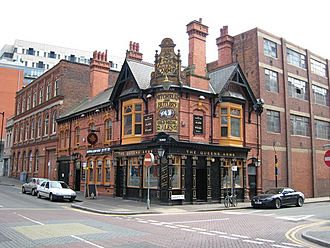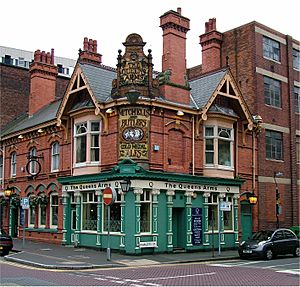Queen's Arms, Birmingham facts for kids
Quick facts for kids Queen's Arms |
|
|---|---|

The Queen's Arms in 2007
|
|
| General information | |
| Type | Public house |
| Location | Jewellery Quarter, England |
| Coordinates | 52°29′01″N 1°54′24″W / 52.4836°N 1.9066°W |
| Completed | c. 1870 |
| Awards and prizes | Grade II listed |
The Queen's Arms is a special building in Birmingham, England. It's a type of building called a "public house," or simply a pub. It was built around 1870.
This building is famous for its beautiful tiled signs on the outside. These signs were added in 1901. An architect named Joseph D. Ward designed them. At that time, a company called Mitchells & Butlers owned the pub.
The Queen's Arms is a red brick building. It sits on a corner where Charlotte Street meets Newhall Street. This area is part of Birmingham's historic Jewellery Quarter.
In April 2004, the Queen's Arms was given "Grade II listed" status. This means it's a very important building. The government protects it because of its history and unique design.
In early 2024, the pub got new owners. They announced that the building would get a big makeover.
You might have even seen the Queen's Arms on TV! Scenes for a BBC show called Line of Duty were filmed inside the pub.
Contents
A Look at Its History
The Queen's Arms has been a part of Birmingham for a long time. It first opened around 1870. Over the years, many people have visited this pub.
Special Design Features
The pub's outside is very eye-catching. It has special tiled artwork in a style called Art Nouveau. This style was popular in the late 1800s and early 1900s. It uses flowing lines and natural shapes. The tiles make the pub stand out.
Location in the Jewellery Quarter
The pub is located on the edge of Birmingham's Jewellery Quarter. This area is famous for making jewelry. It has many old workshops and historic buildings. The Queen's Arms fits right in with the area's rich history.
Protecting Historic Buildings
Being "Grade II listed" means the building is officially recognized as important. This protection helps make sure that historic places like the Queen's Arms are kept safe for future generations to enjoy. It means any changes to the building must be approved to keep its special features.
 | Ernest Everett Just |
 | Mary Jackson |
 | Emmett Chappelle |
 | Marie Maynard Daly |


